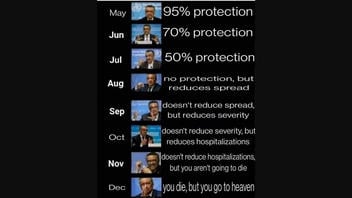
Does this meme paint an accurate picture of the effectiveness of COVID-19 vaccines? No, that's not true: Although what we know about the virus and the vaccines has changed over time, scientists and public health experts continue to say that vaccines work, especially with respect to the risk of severe illness and death. Various factors, including age, the emergence of new variants and time since vaccination can impact the effectiveness of COVID vaccines.
The meme appeared in a Facebook post (archived here) on January 15, 2022. It listed different months and purported changes in the reported effectiveness of the vaccine. For May, for example, the post said: "95% protection." By November, the meme claimed:
doesn't reduce hospitalizations, but you aren't going to die
This is what the post looked like on Facebook at the time of writing:
Let's start with what the meme got right: What we know about COVID-19 and the vaccines has changed -- and will continue to change -- over time. Our understanding evolves along with the science and the progression of the disease. But the meme, which offers no sourcing to substantiate or check its claims, is vastly oversimplified. It's also just plain wrong about some things.
First, starting with its claims about "protection," which vaccine, which people and which variant are the meme talking about? Various factors, including age, the emergence of new variants and time since vaccination, can impact the effectiveness of COVID vaccines, as can the type of vaccine itself.
There are three COVID vaccines approved for use in the United States: the Pfizer-BioNTech vaccine, the Moderna vaccine and the Janssen/J&J vaccine. The first one is reported to be 95% effective at preventing laboratory-confirmed infection in people ages 16 and up who received two doses and had no evidence of being previously infected. That number dips to 90% or more in children ages 5-15. The Moderna vaccine is reported to be 94% effective in people ages 18 and up, while J&J's vaccine is reported to be 66% effective.
That said, all three vaccines are believed to become less effective with time. A recent study published by The New England Journal of Medicine (NEJM) found that vaccine effectiveness against COVID at two months after the first dose versus seven months dropped nearly 28 percentage points for the Pfizer-BioNTech vaccine and some 16 points for the Moderna vaccine. From one month versus five months, effectiveness dropped more than 15 percentage points for the J&J vaccine, according to the study. Other studies have reported different numbers but show the same overall trend of effectiveness declining over time.
Declining vaccine effectiveness is one of the reasons that public health officials push boosters. The Centers for Disease Control and Prevention (CDC) recommends that everyone ages 18 and up should get a booster shot either six months after their initial Pfizer-BioNTech or Moderna series or two months after their initial J&J vaccine.
Another factor that plays a big role in the effectiveness of COVID vaccines is the emergence of new variants. According to the European Medicines Agency, an agency of the European Union, recent studies show that vaccine effectiveness in preventing symptomatic disease is lower for omicron than for other variants. These same studies show, however, that vaccination continues to offer a high level of protection against hospitalization and severe disease.
That message is echoed by the CDC, which says that the three approved vaccines are expected to protect against severe illness, hospitalizations and deaths due to infection with the omicron variant. Similarly, the NEJM study found that the vaccines had "durable effectiveness in reducing the risks of hospitalization and death." That's true even though the study also found that effectiveness tended to be lower among adults ages 65 and older.
In sum, even though the science of the virus and our understanding of it changes over time, it's clear that vaccines continue to offer some degree of protection against COVID, especially when it comes to the risk of severe illness and death. The CDC has pointed out that no vaccine is 100% effective; breakthrough infections will occur. But, according to the CDC, most people who get COVID are unvaccinated, and even when people who are fully vaccinated develop symptoms, they tend to fare far better than do people who are unvaccinated.


















